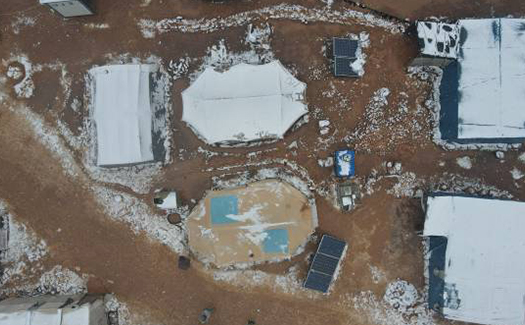We all know that concrete is a robust, durable material that appears unbreakable in the face of extremes. However, just like the man of steel, Superman, concrete has its weaknesses. Even the most durable concrete can display signs of weakness, particularly during the harsh snow season. Unmaintained driveways and pavement can decrease your building’s curb appeal. A major turnoff for consumers! It goes beyond merely talking about quality; it highlights how important it is to maintain your concrete to avoid winter-related issues. The following is a list of winter concrete damages you should be aware of and potential preventative measures you can take to protect your concrete.
Scaling
Scaling happens when concrete is exposed to a very low temperature, high moisture content, and the freeze-thaw cycle. This damage typically shows peeling on the thin layer of the exterior concrete. On the flat slab, there are little flakes and regions of light scaling. If the issue is severe enough, these peels may develop further within the concrete, exposing both the fine and coarse concrete aggregates. Using the incorrect de-icing chemicals can make scaling issues worse.
Spalling
Another concrete problem that develops in the winter is spalling. It occurs when the cracked portions of the flatwork slab have disengaged from the base. The primary cause of the problem is rebar corrosion, which happens when steel materials are exposed to moisture and the freeze-thaw cycle.
Spalling calls for urgent attention. If you let your concrete continue to deteriorate, it could lower the value of your commercial property. Aside from this, this may also affect the client footprint at your establishment. Customers are also more likely to avoid visiting establishments that are risky.
Cracking
Poorly structured concrete is more susceptible to cracking in the winter. The concrete absorbs the water when snow falls, melts, and turns into water when exposed to low temperatures.
Internal tensile pressure brought on by ice formation in the slab can result in fissures. Additionally, avoid salting your concrete because it can make the issue worse.
Keep Your Concrete Safe During the Winter
Avoid potential financial losses brought on by liability lawsuits and company interruptions by preparing your property for winter. It can maintain your commercial property’s structural soundness and cosmetic value even during a snowstorm.
The best defense against concrete damage from snowfall and the freeze-thaw cycle is concrete sealing. It protects your concrete from harsh elements like chemicals, water, ice, snow, and freezing temperatures.
Snow removal is also strongly advised. If snow has fallen on your place of business, contact knowledgeable professionals to handle the difficult task for you. Your concrete will be less likely to get damaged if you keep snow and slush away from it. Make your concrete sturdy, long-lasting, and pleasing for years to come with constant upkeep.
For all of your concrete and snow removal needs, depend on Rahn Companies. With our knowledge and resources, we can deliver dependable and satisfying concrete and snow removal services for your commercial property. Give us a call today and get a free quote.


